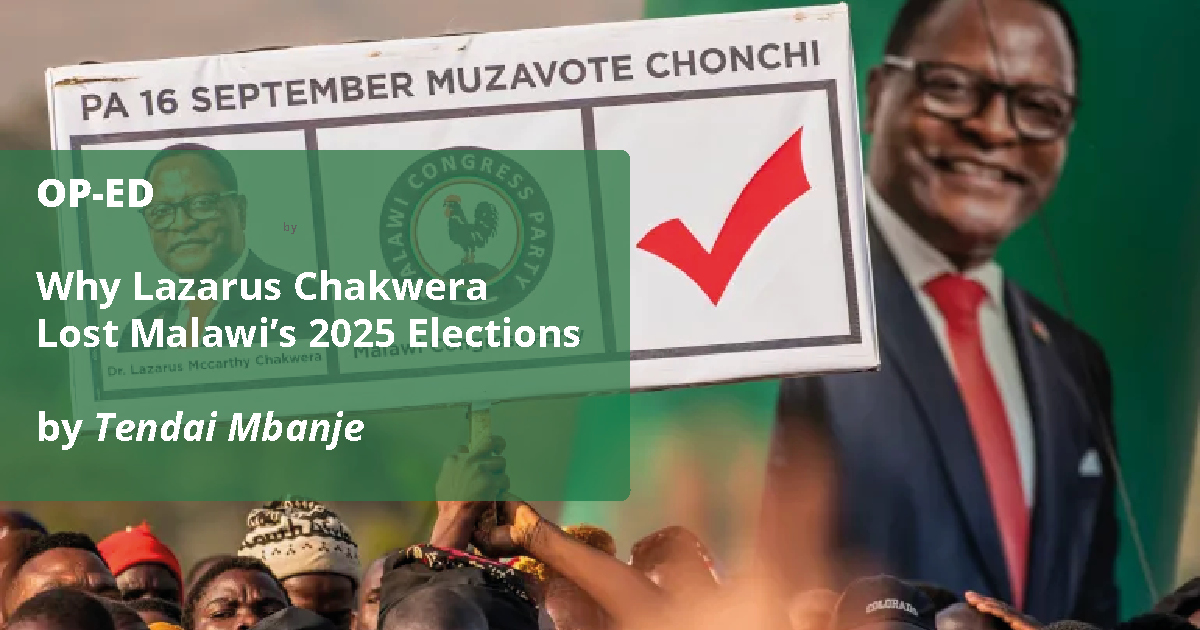As Malawi demonstrated, when citizens mobilise around shared grievances and demand accountability, no amount of rigging can suppress their voice. The message is clear: leadership must be earned through integrity, service, and results or it will be decisively rejected at the ballot box.
The September 16, 2025, presidential election results in Malawi was a referendum on the leadership of President Lazarus Chakwera. His defeat signified a rejection of an administration widely perceived as failing to fulfill its promises, neglecting the needs of ordinary Malawians, and permitting corruption and economic mismanagement. The administration’s record of economic decline contributed to widespread voter dissatisfaction. This analysis is informed by direct field experience, extensive stakeholder consultations, firsthand interactions with citizens across multiple districts, and on-the-ground election observation in Malawi. It reflects a synthesis of lived realities, local perspectives, and institutional engagement within the Malawian context.
Stakeholders interviewed expressed concern that Malawi’s failing economic conditions were at the heart of President Lazarus Chakwera’s political downfall. Citizens across many districts visited by observers voiced deep dissatisfaction, citing soaring inflation reaching 33% which rendered essential commodities like maize and fertiliser unaffordable for millions. Fuel shortages and a persistent lack of foreign exchange further crippled mobility and trade, compounding daily hardships. These were not abstract statistics; as many citizens shared during consultations, they translated into empty stomachs, shuttered businesses, and livelihoods. Civil society groups and community leaders highlighted the alarming reality that over 70% of Malawians live below the international poverty line of $3 a day, according to World Bank data. Youth representatives and economic analysts lamented the administration’s failure to implement meaningful reforms or stimulate job creation, particularly for young people. Instead, many stakeholders perceived Chakwera’s government as directionless, prioritising self-enrichment and enabling corruption over national progress.
Malawi’s economy is deeply rooted in agriculture, yet farmers and rural communities repeatedly voiced that they felt abandoned under President Lazarus Chakwera’s leadership. During consultations in agrarian districts, farmers lamented the skyrocketing cost of fertiliser, which made it nearly impossible to afford the inputs critical for food production. Many shared stories of reduced yields abandoned fields, and growing despair. This neglect, they said, deepened food insecurity leaving half the population unable to meet minimum nutritional requirements. Community members also recounted the devastation caused by cyclones and droughts, which wiped out crops, destroyed infrastructure, and disrupted livelihoods. Despite the scale of these climate-induced disasters, farmers indicated that no comprehensive recovery plan was rolled out. Instead, affected villages were left to fend for themselves, relying on informal networks and limited local resources. The government’s failure to act decisively in the aftermath was widely perceived as a betrayal especially by those who had once placed their hopes in Chakwera’s promises of inclusive development and agricultural transformation.
By 2025 general elections, President Lazarus Chakwera’s political standing had eroded under the weight of broken promises, deepening corruption, and a widening gap between rhetoric and reality. The fragmentation of the Tonse Alliance, once a symbol of unity sent a clear message of disillusionment, with key partners like UTM withdrawing over what they described as poor leadership and betrayal. Citizens and political observers alike viewed Chakwera’s handling of Vice President Saulos Chilima’s death as a turning point, marked by opacity and insensitivity that alienated UTM supporters and fractured public trust. His subsequent choice of running mate further deepened divisions, weakening party cohesion and reinforcing perceptions of lack of political maturity. Despite campaigning on reform, Chakwera’s administration became emblematic of patronage and incompetence, as he failed to act against corrupt officials and instead surrounded himself with loyalists. Taken together, the economic mismanagement, political fragmentation, alienation of key allies, and failure to uphold transparency and meritocracy convinced many Malawians that President Chakwera was unfit for re-election.
Field reports and analyst observations during the 2025 campaign revealed deep organizational weaknesses within the ruling Malawi Congress Party (MCP), marked by limited understanding of rural community needs, reliance on biased state media, and failed voter engagement that amplified public dissent. Tactics such as vote buying and superficial engagement alienated voters and reinforced perceptions of a regime disconnected from grassroots realities. Concerns over the Malawi Police Service’s capacity to manage electoral tensions further exposed governance failures, while unresolved issues around campaign finance and gender representation underscored the fragility of democratic institutions. Chakwera’s defeat was not merely a political loss but it was a collective reckoning, driven by citizens’ demand for accountable, competent, and compassionate leadership.
The lessons from Malawi’s 2025 election are not unique. Across the region, citizens are increasingly rejecting leaders who fail to deliver on promises, with the Botswana Democratic Party (BDP) serving as another striking example. Once dominant, the BDP was voted out by an electorate fed up with incompetence, economic stagnation, and governance failures echoing the same frustrations that led to Chakwera’s downfall in Malawi. This reflects a broader continental shift: voters are more informed, more connected, and less willing to tolerate corruption, broken promises, and leadership that prioritizes loyalty over competence. Attempts to manipulate outcomes through vote buying, media bias, or institutional capture are proving ineffective against the sheer force of public will. As Malawi demonstrated, when citizens mobilise around shared grievances and demand accountability, no amount of rigging can suppress their voice. The message is clear: leadership must be earned through integrity, service, and results or it will be decisively rejected at the ballot box.


